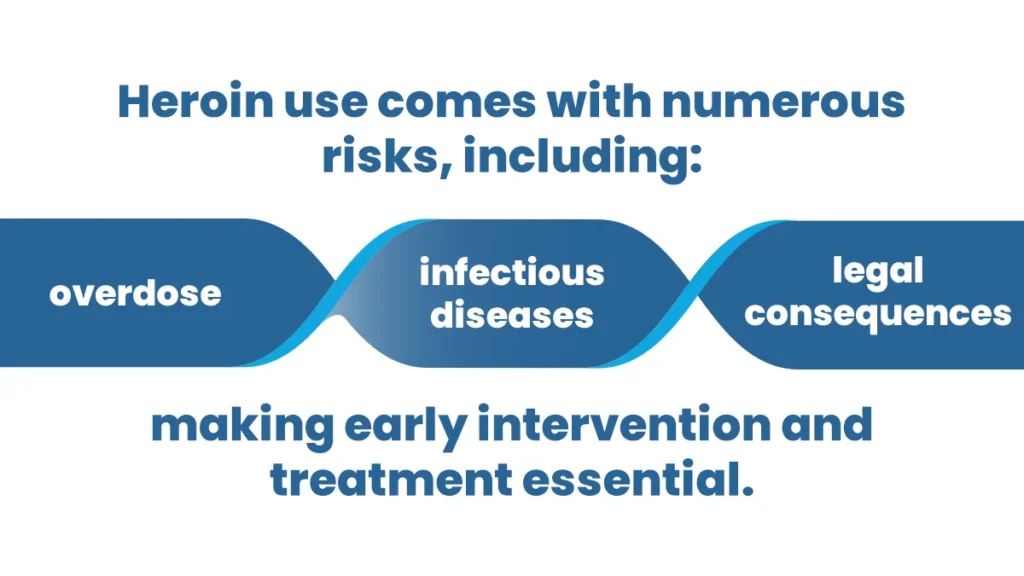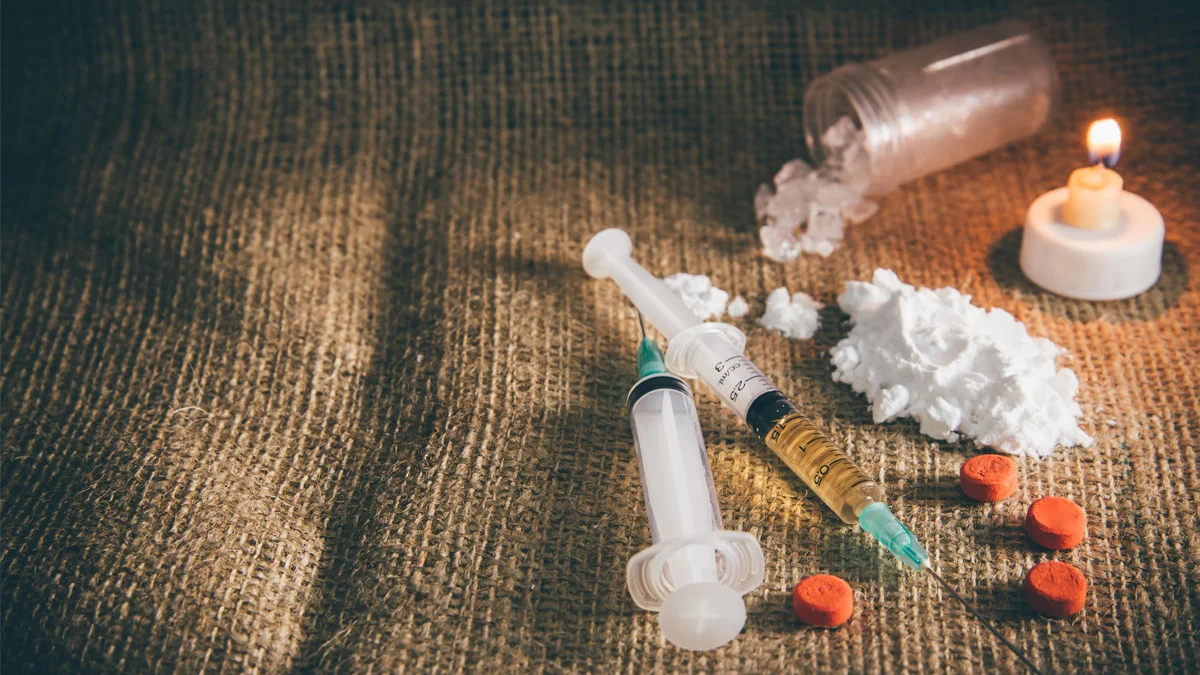Heroin addiction often shows through noticeable behavioral changes. These may include sudden mood swings, withdrawal from family and friends, and a loss of interest in hobbies.
Physical symptoms such as needle marks, weight loss, and irregular sleep patterns are common indicators. Keep reading to understand how to spot these signs in a loved one seeking the necessary aid to overcome their addiction.
Key Takeaways
Heroin is a banned opioid derived from morphine found in opium poppy plants. Here’s what you need to know:
Heroin Defined
Before delving into the symptoms of heroin addiction, it’s essential to understand what heroin is. Heroin is an illicit opioid drug derived from morphine, a natural substance in the seeds of the opium poppy plant.
It is typically a white or brown powder, though it can also appear as a black sticky substance known as black tar heroin. Heroin is commonly ingested through injection, smoking, or snorting.
In addition, researchers in the United States are diligently studying the impact of environmental factors on addiction, with real-life examples from the streets highlighting the dangers of illicit drugs like the black sticky substance known as heroin.
Physical Symptoms of Heroin Addiction
The following symptoms are often the first visible indicators of a person’s struggle with this dangerous drug.
- Pinpoint Pupils: One of the telltale signs of heroin use is constricted (pinpoint) pupils, even in well-lit environments. It is due to the drug’s immediate effects on the nervous system.
- Track Marks: Injection drug use often leaves visible marks or scars known as track marks. These are minor puncture wounds or sores at injection sites, typically found on the arms or legs.
- Drowsiness: Abuse of heroin can cause extreme tiredness and a feeling of nodding off, often called nodding out. Individuals may appear lethargic and unable to stay awake.
- Itchy Skin: People who use heroin experience intense itching and may scratch their skin frequently. It is a result of histamine release caused by the drug.
- Flu-Like Symptoms: Heroin withdrawal can lead to flu-like symptoms, including chills, muscle aches, and sweating. These symptoms can be mistaken for a common illness.
The recognition of these symptoms can serve as a gateway to addressing the broader issues of heroin addiction and withdrawal.
Psychological Symptoms of Heroin Addiction
The psychological symptoms of heroin addiction delve into the emotional and cognitive effects that this drug exerts on individuals.
- Euphoria: Heroin induces intense feelings of joy and pleasure, which can lead to a craving for the drug. Individuals may constantly seek this euphoric state.
- Mood Swings: Heroin addiction is associated with dramatic mood swings. Individuals may become irritable, anxious, or even hostile when the drug’s effects wear off.
- Depression: Chronic heroin use often leads to depression and a sense of hopelessness. People may withdraw from social activities and lack interest in previously enjoyed hobbies.
- Impaired Decision-Making: Heroin can impair judgment and decision-making, leading to risky behaviors and poor life choices.
Addressing the complexities of heroin addiction can facilitate the path to recovery and mental well-being.
Behavioral Symptoms of Heroin Addiction
Behavioral symptoms of heroin addiction can have profound and far-reaching effects on a person’s life.
- Neglecting Responsibilities: As heroin addiction takes hold, individuals may neglect their responsibilities at work, home, and school. It can result in job loss, financial strain, and strained relationships.
- Isolation: People often isolate themselves from family and friends with the use of heroin. They may spend most of their time with fellow people or alone.
- Secrecy: Addicts often become secretive about their activities, including where they go, who they associate with, and how they spend their time.
- Legal Issues: Heroin addiction can lead to legal problems due to activities related to drug use, such as theft, possession, or distribution of the drug.
- Neglect of Hygiene: People with heroin may neglect personal hygiene, which can lead to physical deterioration and health issues.
Behavioral symptoms help recognize heroin addiction and support those struggling.
Signs of Heroin Withdrawal
Heroin withdrawal occurs when a person dependent on the drug stops using it. Common withdrawal symptoms include:
- Nausea and Vomiting: Withdrawal often begins with nausea, which can lead to vomiting.
- Diarrhea: Individuals in withdrawal may experience diarrhea, leading to dehydration and discomfort.
- Sweating: Profuse sweating is a common symptom of heroin withdrawal, contributing to dehydration as well.
- Anxiety and Restlessness: Withdrawal can lead to heightened anxiety and restlessness, making it difficult for individuals to stay still.
- Muscle and Bone Pain: Heroin withdrawal is associated with severe muscle and bone pain, making even the slightest movements excruciating.
- Insomnia: Sleep disturbances and insomnia are common during withdrawal, exacerbating feelings of discomfort.
The symptoms can be severe and uncomfortable, driving individuals to use it again to relieve their distress.

Risks and Complications of Heroin Use
Heroin use carries a myriad of risks and complications that can severely impact an individual’s health and well-being. Some of these risks include:
- Overdose: Heroin overdose is a life-threatening emergency. Its outcome results in respiratory failure, leading to brain damage or death.
- Infectious Diseases: Sharing needles or engaging in risky sexual manners can lead to the transmission of infectious diseases, including HIV and hepatitis.
- Mental Health Issues: Chronic heroin use can exacerbate or lead to mental health disorders, such as depression and anxiety.
- Physical Health Problems: Heroin use can cause a range of physical health problems, including heart issues, liver and kidney damage, and collapsed veins.
- Legal Consequences: Possession, sale, or distribution of heroin is illegal, and those caught with the drug can face legal consequences, including imprisonment.
The risks and complications associated with the use of the drug have manifold consequences, highlighting the urgent need for treatment and support.
Treating Heroin Addiction
Heroin addiction is curable, and recovery is possible with the proper support and interventions. Here are some standard treatment options for heroin addiction:
Heroin Detox: The initial step in treating heroin addiction is detoxification, which involves safely removing the drug from the body. It can be a challenging and uncomfortable process, but it is a critical step to break the physical dependence on heroin.
Inpatient Rehab: Inpatient rehabilitation programs offer a structured and supportive atmosphere for individuals in early recovery. Patients receive 24-hour care, therapy, and counseling to address both the physical and psychological facets of addiction.
Cognitive Behavioral Therapy: CBT is an influential approach that helps people admit and change negative emotions and thought patterns linked with addiction. It equips them with coping strategies to prevent relapse.
Support Groups: Joining support groups, such as Narcotics Anonymous (NA), can provide an intent of community and encouragement for individuals in recovery. The group sessions offer a safe space to share incidents and receive guidance from peers who have gone through similar challenges.
Aftercare: After completing a formal treatment program, individuals are encouraged to engage in aftercare services, including continued therapy, counseling, and ongoing support to maintain their recovery.
If you suspect that someone you care about is struggling with heroin addiction, it’s essential to reach out to them and offer your support. Please inspire them to seek professional help and provide a non-judgmental, empathetic space for them to open up about their challenges. Addiction is a complex issue, but recovery is possible with the right resources and support under medical supervision.
Frequently Asked Questions (FAQ)
What are the common physical symptoms of heroin addiction?
Heroin addiction often exhibits various physical symptoms. The drug quickly crosses the blood-brain barrier, leading to a surge of euphoria. It can cause a drop in heart rate, leading to severe health consequences.
Physical symptoms may include drowsiness, track marks from injection, itchy skin, and flu-like withdrawal symptoms. Genetics can influence a person to manage this drug addiction. Seeking medical attention is crucial for those suffering from opioid use disorder.
Why is heroin withdrawal so hard to go through?
Heroin withdrawal is exceptionally challenging due to several factors. Heroin abuse triggers tolerance and binds to opioid receptors in the brain, inducing a rush of euphoria. When drug abuse ceases, the body struggles to function normally. Heroin withdrawal symptoms, including heart rate irregularities and extreme discomfort, can persist for hours, making it an agonizing experience.
Moreover, environmental and genetic risk factors, along with personality traits, play a crucial role in an individual’s ability to cope with withdrawal. Support from family members and professional help, such as that provided by The Haven Detox-New England, is integral for those suffering from substance abuse, including heroin use disorder.
The Haven Detox-New England: Recovery Starts Here
At The Haven Detox-New England, we’re the key to unlocking those chains of addiction. We have a bridge of services for your liberation, where the detox process paves the way, gently dismantling physical dependence. As you enter residential treatment, you step into a realm of rebirth.
With dual diagnosis support, we address co-occurring challenges, including addiction and mental health, ensuring a comprehensive approach. So, let’s co-create your narrative of resilience. Call us at (844) 933-4145 for more information.
Verify Insurance
Let’s get you or a loved one help with a few simple steps.
-
Heroin Treatment
- Beyond Pleasure: The Addictive Nature of Heroin
- Exploring the Long-Term Effects of Heroin
- Heroin and Its Effects on the Body
- Heroin Withdrawal Timeline and Coping Strategies
- How to Detect a Heroin Overdose
- Identifying Symptoms of a Heroin Addiction
- Signs That Point to Heroin Use
- What Does Heroin Do? Understanding the Impact




